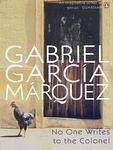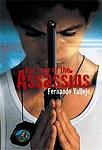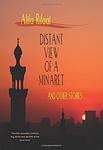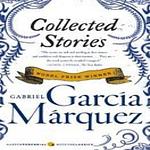The Greatest Colombian, Egyptian "Fiction" Books Since 1900
Click to learn how this list is calculated.
This list represents a comprehensive and trusted collection of the greatest books. Developed through a specialized algorithm, it brings together 300 'best of' book lists to form a definitive guide to the world's most acclaimed books. For those interested in how these books are chosen, additional details can be found on the rankings page.
Genres
Countries
Date Range
Reading Statistics
Click the button below to see how many of these books you've read!
Download
If you're interested in downloading this list as a CSV file for use in a spreadsheet application, you can easily do so by clicking the button below. Please note that to ensure a manageable file size and faster download, the CSV will include details for only the first 500 books.
Download-
1. One Hundred Years of Solitude by Gabriel García Márquez
This novel is a multi-generational saga that focuses on the Buendía family, who founded the fictional town of Macondo. It explores themes of love, loss, family, and the cyclical nature of history. The story is filled with magical realism, blending the supernatural with the ordinary, as it chronicles the family's experiences, including civil war, marriages, births, and deaths. The book is renowned for its narrative style and its exploration of solitude, fate, and the inevitability of repetition in history.
-
2. Love in the Time of Cholera by Gabriel García Márquez
This novel follows the story of Florentino Ariza and Fermina Daza, who fall passionately in love in their youth. However, Fermina eventually marries a wealthy doctor, leaving Florentino heartbroken. Despite this, Florentino remains devoted to Fermina for over fifty years, patiently waiting for her husband's death to have another chance at her love. The story is set against the backdrop of a cholera epidemic, serving as a metaphor for the transformative power of love and the destructive power of obsession.
-
3. Woman at Point Zero by Nawal El Saadawi
"Woman at Point Zero" is a powerful novel about a woman named Firdaus who, after a life filled with hardships and abuse, finds herself on death row in an Egyptian prison. The narrative explores her life story, from her childhood of poverty and genital mutilation to her experiences with domestic violence, prostitution, and finally murder. Through her journey, the book offers a profound critique of patriarchal society and the systemic oppression of women.
-
4. Chronicle of a Death Foretold by Gabriel García Márquez
The novel unfolds as a murder mystery, revealing the planned revenge killing of a young man named Santiago Nasar by the Vicario brothers. They believe Santiago has dishonored their sister, Angela, by taking her virginity before her marriage to another man. Despite the impending murder being common knowledge within the small Colombian town, a series of coincidences and misunderstandings prevent anyone from intervening, leading to Santiago's tragic and foretold demise. The narrative explores themes of honor, fate, and the collective responsibility of a community.
-
5. Children of Gebelawi by Naguib Mahfouz
"Children of Gebelawi" is a novel that allegorically presents the stories of Moses, Jesus, and Mohammed through the lives of characters in a Cairo neighborhood. The patriarch, Gebelawi, has five children, each representing a different prophet or religious figure, and their struggles mirror the religious and philosophical conflicts of the 20th century. The book explores themes of power, faith, and redemption, and it sparked controversy upon publication due to its portrayal of sacred figures.
-
6. Palace Walk by Naguib Mahfouz
The novel is set in Cairo during World War I and revolves around the life of a conservative Muslim family. The patriarch, a shopkeeper, has two wives and several children, and the story explores the dynamics within the family, particularly the tyrannical father's relationships with his wives and children. As the family navigates through a changing society, they encounter various challenges including political unrest, societal norms, and the struggle between tradition and modernity.
-
7. The Autumn of the Patriarch by Gabriel García Márquez
The novel explores the life of an eternal dictator who has ruled over a Caribbean nation for several decades. The patriarch's oppressive regime is marked by corruption, violence, and absurdity, while his personal life is characterized by loneliness and paranoia. The narrative is a complex, non-linear exploration of power, time, and the dehumanizing effects of political tyranny. The patriarch's death prompts a reflection on his life and reign, revealing a mythical, magical, and horrifying reality.
-
8. No One Writes to the Colonel by Gabriel García Márquez
This novel centers around an impoverished, retired colonel who has been waiting for many years for the pension he was promised. Despite his increasing desperation and the urging of his wife, the colonel remains hopeful and proud, refusing to sell his only valuable possession, a rooster that he plans to enter in a cockfight. The story explores themes of poverty, pride, and the struggle for dignity amid difficult circumstances.
-
9. The Cairo Trilogy by Naguib Mahfouz
"The Cairo Trilogy" is a captivating tale set in Egypt during the early 20th century, following the lives of the Abd al-Jawad family. The trilogy explores the intricacies of family dynamics, societal changes, and political unrest, as it delves into the personal struggles and triumphs of its characters. With vivid descriptions and rich storytelling, the trilogy offers a deep insight into the complexities of Egyptian society, tradition, and modernization, making it a timeless masterpiece of literature.
-
10. The Vortex by José Eustacio Rivera
"The Vortex" is a gripping narrative set in the early 20th century that plunges readers into the harrowing depths of the Amazon rainforest. The story follows the journey of Arturo Cova, a man fleeing from his troubled past and societal constraints, who becomes ensnared in the brutal world of rubber tapping. As he ventures deeper into the jungle, Cova encounters the relentless exploitation of both the land and its people, driven by the insatiable greed of the rubber barons. The novel exposes the darkness of human nature and the savage conditions of life in the rainforest, painting a vivid picture of the environmental and social devastation wrought by colonialism and the rubber trade.
-
11. Miramar by Naguib Mahfouz
Set in 1960s Egypt, "Miramar" tells the story of an aging revolutionary, a rich man's daughter, a corrupt journalist, and a real estate agent who all come to reside at the Miramar Pension in Alexandria. Their lives intertwine with the life of the young peasant woman who works there as a maid, and through their interactions, the novel explores themes of social and political change in Egypt, the struggle between old and new, and the power of the individual to shape their own destiny.
-
12. Midaq Alley by Najib Mahfuz
Set in an old Cairo neighborhood during World War II, the novel delves into the lives of the residents of a bustling alley, offering a tapestry of human experiences and social issues. Through the stories of a diverse cast of characters, including a young beauty dreaming of a better life, a wealthy businessman seeking love, a cafe owner yearning for his past, and others, the narrative explores themes of love, ambition, and the struggle for personal fulfillment. The alley serves as a microcosm of society, reflecting the larger cultural and political changes occurring in Egypt at the time, and the characters' intertwined lives illustrate the complexities of human nature and the universal quest for happiness and meaning.
-
13. Two Women In One by Nawal El Saadawi
The novel explores the internal and external struggles of a young Egyptian woman who aspires to be a dancer and artist, defying the traditional gender roles and societal expectations imposed upon her. As she pursues her passion, she faces oppression and resistance from a patriarchal society that seeks to control women's bodies and minds. The protagonist's journey is one of self-discovery and rebellion, as she battles to reconcile her desires with the harsh realities of her environment, ultimately striving to forge her own identity and find freedom within a repressive cultural landscape.
-
14. Zayni Barakat by Jamal al- Ghitani
"Zayni Barakat" is a captivating novel set in 19th-century Egypt, following the life of Zayni Barakat, a young man caught in the midst of political and societal turmoil. As he navigates through a world of corruption, power struggles, and forbidden love, Zayni's journey becomes a reflection of the struggles faced by the Egyptian people. Through vivid storytelling and rich historical context, the book explores themes of identity, revolution, and the complex dynamics of a nation on the brink of change.
-
15. The Adventures and Misadventures of Maqroll by Alvaro Mutis
"The Adventures and Misadventures of Maqroll" is a collection of seven novellas that follow the life of Maqroll, a seafarer and adventurer. The stories, set in various locations around the globe, are filled with philosophical musings, poetic language, and vivid descriptions of exotic locales. Maqroll's encounters with a host of characters, from pirates to prostitutes, and his experiences with love, loss, and loneliness, all contribute to a richly textured narrative that explores the human condition and the nature of existence.
-
16. Our Lady of the Assassins by Fernando Vallejo
This novel is a dark and gripping exploration of life in Medellín, Colombia, during the height of the drug wars. The protagonist, a middle-aged writer, returns home after many years abroad, only to find his city ravaged by violence and death. He falls in love with two teenage assassins, who guide him through the underworld of the city, exposing him to the brutal realities of life in a place where human life has lost all value. The story is a bleak commentary on the devastating effects of drug trafficking and political corruption on society.
-
17. Distant View Of A Minaret by Alifa Rifaat
The book is a collection of short stories that delve into the lives of women in contemporary Egyptian society, offering a poignant and often stark portrayal of the challenges they face. Through the lens of various female protagonists, the stories explore themes of sexuality, marriage, fidelity, and the role of women within the constraints of a patriarchal culture. The narratives often highlight the inner lives and suppressed desires of these women, revealing the gap between personal aspirations and societal expectations. The title story epitomizes the collection's essence, presenting a woman's reflection on her unfulfilling marriage and her yearning for spiritual and emotional fulfillment, symbolized by the distant view of a minaret.
-
18. 100 Years Of Solitude by Gabriel García Márquez
The novel chronicles the rise and fall of the Buendía family over seven generations in the mythical town of Macondo, founded by the family's patriarch, José Arcadio Buendía. The story delves into the lives of the Buendía family, whose members experience love, lust, obsession, and despair, intertwined with magical and surreal events. The family's history mirrors and critiques the social and political evolution of Latin America, exploring themes of solitude, destiny, and the inevitability of history repeating itself. The novel's rich, imaginative narrative has made it a cornerstone of magical realism, profoundly influencing the literary world.
-
19. The Open Door by Latifa Zayyat
The novel explores the journey of a young Egyptian woman during the 1940s and 1950s, a period of political turmoil and social change in Egypt. As she comes of age, the protagonist grapples with the constraints of traditional societal expectations and her desire for personal and intellectual freedom. Her story intertwines with the broader narrative of her country's struggle against British colonialism and the quest for national identity, reflecting the broader themes of liberation and self-determination. Through her experiences, the book delves into issues of gender, politics, and the quest for meaning in a rapidly changing world.
-
20. Collected Stories by Gabriel García Márquez
"Collected Stories" brings together a diverse array of tales that blend the magical with the mundane in a uniquely evocative manner. The stories traverse a variety of settings and characters, each infused with the author's rich imagination and lyrical prose. Themes of love, violence, and destiny are explored through narratives that often blur the lines between reality and fantasy, capturing the complexities of human experience and emotion. This collection showcases the author's ability to illuminate the extraordinary within the ordinary, making the familiar seem fantastical and the fantastical accessible.
-
21. The Sound Of Things Falling by Juan Gabriel Vásquez
"The Sound Of Things Falling" is a thought-provoking novel that delves into the complex and haunting aftermath of the drug trade in Colombia. Set against the backdrop of a turbulent country, the story follows the lives of two men whose paths intertwine in unexpected ways. Through vivid storytelling and poignant reflections, the book explores themes of memory, guilt, and the lasting impact of violence on individuals and society.
-
22. Catalina by Elisa Mujica
"Catalina" is a historical novel set in the 16th century, which delves into the life of a young woman of noble birth in the Spanish colony of New Granada (modern-day Colombia). The narrative follows the titular character as she navigates the complexities of her social position, love, and the restrictive norms of the time. As she grows, she becomes increasingly aware of the injustices surrounding her, particularly those faced by the indigenous people and women. The novel explores themes of power, identity, and resistance, painting a vivid picture of colonial Latin America through the eyes of a character caught between the expectations of her society and her personal desires for freedom and self-expression.
-
23. Las Estrellas Son Negras by Arnoldo Palacios
The book is a poignant narrative set in the Chocó region of Colombia, where it delves into the harsh realities faced by Afro-Colombian communities. Through the eyes of its protagonist, the story explores themes of racial discrimination, poverty, and the struggle for survival in a society marred by social inequality. The protagonist's journey is one of resilience and determination, as he confronts the systemic barriers that oppress his community, revealing the often invisible suffering of marginalized groups in Latin America. The title itself, translating to "The Stars Are Black," serves as a metaphor for the obscured hopes and dreams of those living under the shadow of oppression.
-
24. The Map Of Love by Ahdaf Soueif
This novel intricately weaves together the lives of two women, separated by a century, who find themselves connected through a shared history and a mysterious collection of letters and journals. Set against the rich backdrop of late 19th and 20th-century Egypt, the story explores themes of love, politics, and the enduring impact of colonialism. As the modern-day protagonist delves into the past, she uncovers a passionate love affair between her ancestor, an Englishwoman, and an Egyptian nationalist. This discovery leads her on a journey of self-discovery and a deeper understanding of her cultural heritage, revealing the complexities of identity, the power of love, and the intricate map of human connections that transcends time and place.
-
25. Palace of Desire by Naguib Mahfouz
"Palace of Desire" is a novel set in Cairo in the 1920s, continuing the saga of the Cairene patriarch Al-Sayyid Ahmad and his family. It explores the dynamics of the family, the father's authoritarian rule, the sons' rebelliousness, and the daughters' submissiveness. The book also delves into the themes of love, lust, power, and the struggle between tradition and modernity in Egyptian society. The narrative is a blend of social realism and psychological insight, offering a vivid portrait of a society in transition.
Reading Statistics
Click the button below to see how many of these books you've read!
Download
If you're interested in downloading this list as a CSV file for use in a spreadsheet application, you can easily do so by clicking the button below. Please note that to ensure a manageable file size and faster download, the CSV will include details for only the first 500 books.
Download



















